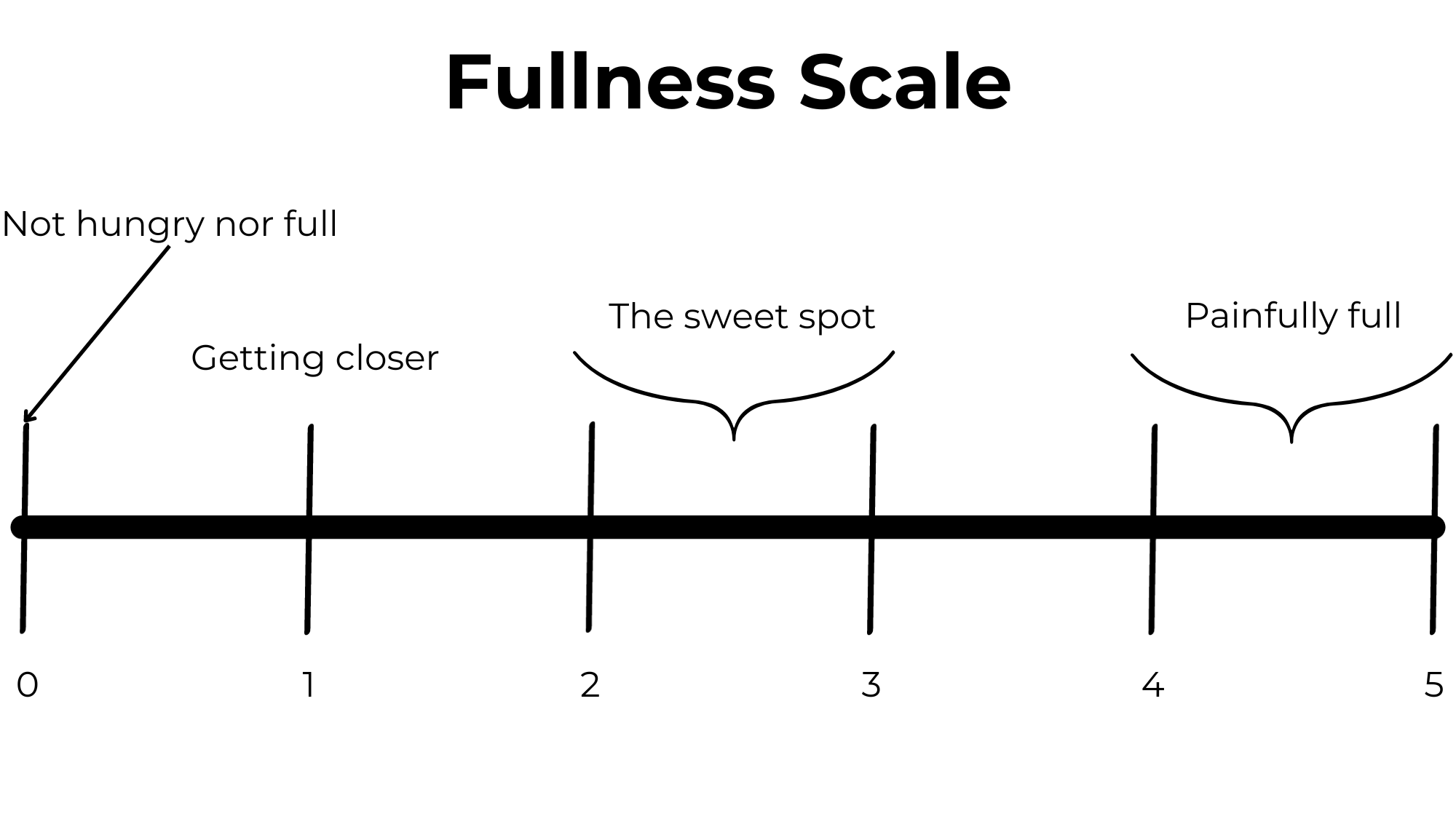How to know if you are overeating

Here’s what you can do to stop overeating and feel good around food
Overeating just means to eat more than your body needs or more than feels comfortable. However the term overeating is often used to imply there is a correct amount to eat and eating more than this is… well bad or glutinous. But eating is not so black and white. Here’s how to know if you are overeating and what you can do to feel good around food.
What is overeating?
When I work one-on-one with clients, I hear different perspectives on what overeating feels like.
For many, the constant worry of eating too much has triggered a fear of a deeper fullness. This fear may drive you to stop eating before true satisfying fullness. In this case, what feels like overeating may just be a normal level of fullness that is feeling uncomfortable.
For others, we might be comparing ourselves to food or portion ideals. As a society, the idea of undereating at a meal (such as following a diet) is often considered morally better than overeating. This has left us comparing what we eat to food portions that are not enough to reach true fullness.
While in other cases, we might find we don't notice comfortable fullness until we reach an uncomfortable or even painful fullness. This may be a daily occurrence and paired with enjoyment of food. Or it may be paired with an out-of-control eating experience (such as emotional eating or binge eating) where you feel unable to act on body sensations.
Eating provides more than nutrition
Food is not just a “nutritional need”. Of course we need energy and nutrients from food to keep us alive and well. But to really live, food provides us with so much more. Joy, comfort, memories, satisfaction, social connection, culture and more.
Sometimes eating may bring on a deep or uncomfortable fullness but in that moment it might also be serving us socially or culturally or emotionally. This is all valid from time to time, it's not wrong to eat until a really deep fullness. When food has served us in these other ways and we have felt connected with the eating experience, it may not really be overeating but just a part of the human experience.
Signs you are overeating
If you are overeating, these are some of the feelings and behaviours you may experience.
Feeling discomfort, pain or extreme fatigue after eating.
Fullness exists on a spectrum. If we imagine 0 being “neutral” where we are not hungry and not full. While 5 is the fullest we can imagine, often associated with pain, discomfort and fatigue. We may find that a 2-3 level of fullness is the sweet spot where we feel pleasantly satisfied and full for a few hours.

A level 4-5 on your fullness spectrum may be where fullness feels uncomfortable, painful or you feel completely fatigued. If you reach this uncomfortable fullness level from time to time (and it is not associated with feeling out-of-control around food) that’s pretty normal. But if it is happening often or you feel out-of-control, guilt or shame, then it may be time to explore what you need to feel good around food.
Restrict- overeating cycles
This cycle can feel like extreme hunger (or an out-of-control feeling toward food) followed by eating to a point of discomfort. The overeating may happen at the end of the day such as after you have been busy with work or “being good” around food all day. Or it might happen on weekends when you allow yourself some leeway after “eating well” all week.
Commonly eating for non-hunger reasons
It’s normal to eat for non-hunger reasons from time to time. Such as having set meal times or social events and for comfort or emotional support. If non-hunger eating is happening often, it feels out-of-control or it is an ineffective tool to cope, then this may be a sign of overeating.
What you can do to feel good around food
Here’s some first steps you can take if you experience overeating and want to feel good around food.
Permission to eat
Give yourself permission to eat as much as you need to satisfy you now and later. This is especially important if you have just experienced overeating. Trying to make up for overeating by plans to eat less later or over-exercising is a risk factor for developing binge eating or an eating disorder.
Honour your hunger and fullness
A common reason for overeating is not eating enough at other times of the day. Simply put, you are hungry whether you feel it or not. If your body does not know that enough food is available most of the time, then it will want you to eat as much as possible when you do eat, resulting in eating until you are stuffed.
Before you can honour your fullness, you must honour your hunger. If you are not eating regularly throughout the day, you are likely to eat more when you do eat. Honouring your hunger throughout the day (whether you feel it or not) with regular and satisfying meals is essential to being able to feel and honour your fullness.
Give yourself compassion
There’s no morality to overeating. There’s nothing wrong with you. From time to time we may simply not notice our body’s fullness until it’s uncomfortable. We may also be choosing to keep eating for another reason such as comfort, pleasure and connection with others.
Give yourself compassion if you experience overeating, notice how long the feeling takes to pass and remind yourself you still need and deserve to eat regularly.
Trust your body instead of food rules
Your body is your number one guide when it comes to eating. No food rule or diet can tell you what your body needs. If you are trying to follow rules about how much to eat, it is likely to backfire and lead to overeating.
Instead, build trust with your body’s hunger and allow the foods that really satisfy you, not just fill your stomach.
When to seek support
In some cases, it may be best to seek some support. Here’s some signs a little support may be really beneficial.
1. Eating often feels out-of-control
If overeating is associated with feeling like you can’t stop or you are not in your body, it may be a sign of binge eating, emotional eating or an eating disorder and may indicate there is more to explore. Specialised support can help you identify the triggers so you can get the support you deserve.
2. You frequently eat until you feel very uncomfortable
If you are often eating until discomfort, it may be helpful to seek specialist support to help you feel your fullness signals earlier. You may also benefit from untangling other body communication as well such as hunger, self care and emotional needs.
3. You’re confused with how to eat without food rules
After years of being taught we need food rules or diets, we can start to lose connection with our body’s communication for hunger, fullness and satiety. It is possible to connect back with your body to guide your eating. With a little support, you can learn to feel and trust the sensations inside your body that innately guide your eating.
As a Certified Intuitive Eating Counsellor I am specialised in supporting you to identify triggers to uncomfortable or out-of-control eating and to re-learn how to work with your body to eat and live in a way that supports your unique body.
Summary
It is normal to feel deep or uncomfortable fullness sometimes. Our society can sometimes invoke worry or fear over normal eating experiences or eating for pleasure, connection and emotion. However, if eating to a point of discomfort happens often, causes guilt or is associated with discomfort it may be worth exploring further. This can include steps to take yourself or seeking support from a Certified Intuitive Eating Counsellor.
If you are looking for support to feel good around food, you can get in touch here.
Want 1-to 1 support?
Learn how you are supported to feel good around food.








